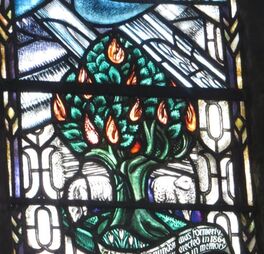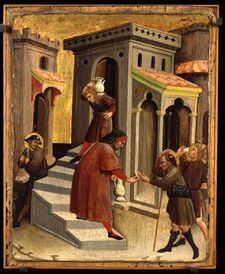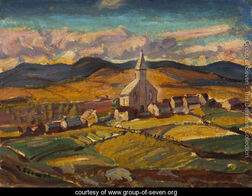 Sometimes we can feel a little sluggish or reticent to do something that deep down we know we must. This experience can even be a bit guilt producing. But knowing that the prophets of the Old Testament struggled with the same thing should offer some comfort. Although often they were being asked to do things that were incredibly heroic, struggling with following through on something is not uncommon. There are many such stories, not the least of which is the encounter of Moses with the burning bush.* Moses certainly had a valid excuse for hesitating at first; although of Hebrew parentage, he was raised Egyptian. Therefore, he would have known about the God of Israel, but probably thought of Him as one among many. Because of this he knew to prostrate himself in front of that bush ‘aflame but not consumed.’ After God stated that he had been chosen to set His people free, Moses came up with multiple excuses as to why he was not the right guy for the job. God countered each of the excuses, giving Moses the ‘incentive’ he needed, and so he accepted the call, though with some reticence. Eventually he entered Egypt filled with steadfast faith which enabled great courage. So what changed? Careful reading indicates that after his first encounter with God, Moses began to trust the process of letting God’s presence take root within Him. (Exodus 2-4) To put it another way, he allowed himself to become inspired by the mercy and love of God. Being so inspired changed his heart, and his life took on new meaning and purpose as he became increasingly filled with the Spirit of God.  It was not just the prophets who were moved by God’s Spirit, but the writers of the Scriptures were filled with the inspiration of God as well. We refer to this as biblical inspiration. That is, they allowed God’s word to resonate in their hearts such that they could announce it to His people. To understand this better, we can look at the word inspiration and what it actually means. Theologically, it is defined as “a divine influence directly and immediately exerted upon the mind or soul.” The roots of the word ‘inspire’ are Latin: inspirare means “to breathe or blow into,” related to the word spirare meaning, “to breathe.” This indicates that inspiration is something literally breathed in during prayerful reflection. To understand this more fully, we also need to turn to the Hebrew word used to describe the Lord hovering over the waters of creation, ruah, (Genesis 1:2) which means spirit, wind, or breath. So for example, when God breathed into the creature He made, called Adam, God was putting His own Spirit into him, (Gen 2:7); or one could say God was inspiring Adam!  To be clear, while inspiration is a direct influence by God it is not forced upon anyone; we are free to act on it or leave it be. (Again, the reference here is about that which moves us.) However, when one encounters the Living God in any way, it can be difficult to ignore indefinitely since God can be quite persistent and knows what is for the best. God’s inspiration is meant to reveal so as to give greater knowledge or wisdom, and thus to empower our response. It is also a way for Him to fill us with His love and mercy. In other words, to be inspired by God is a great gift and it is not reserved for prophets and biblical writers. These people were all ordinary men and women prior to ‘breathing in’ God’s offered gift; it was their cooperation with the gift that made them heroic. This was true of the apostles who were chosen by Jesus as well. They were all simple, ordinary people, but what enabled them was openness and love for God. Inspiration, breathing in God, is meant as a touch of love; it is rather intimate. Therefore, the best way to be open to God’s influence is to avail ourselves of the opportunity to be present to Him. Without prayer and reflection it is difficult to truly be open to receiving the word of God whispered in our hearts and souls. If we are surrounded by noise and distraction, our attention is diverted away from God and His message. But if we create the space and time for prayer, we become receptive to His presence whether He intends for us to act on it in some way or not: it is about cultivating attentiveness to Him.  The inspiration God offers is unique to each one. We need not be fooled into thinking that our efforts are too small or insignificant to be of use to Him.** As disciples all we need is faith and willingness. It is the strength of our relationship built in mutual love that will allow us to breathe in His Spirit, opening every moment to God’s influence. When that happens, His word will grow within us, just as it did within the writers and prophets. If we have hesitated in the past, there is no reason to allow guilt over it to deteriorate our resolve into inertia. Instead, let us realize that inspiration is about God’s love. It is His breath in our hearts and souls, that is, His love, which makes us holy, and it is His love which builds the Kingdom to which we have been called.  May we take the time to breathe in the presence of God! May we discover God’s call to bring life and hope to those whom we encounter daily! May we find the mission to which we are called no matter how small or large it seems to be, and then allow God’s presence to empower us in carrying it out! And may we be a beacon of inspiration to others through simple acts of love, sharing that which we have received! Let us meet in the Heart of Jesus! Peace! ©Michele L. Catanese Notes: -The title of this entry is from a hymn, based on a plainchant melody, that we used to sing when I was in religious life, usually before morning or evening prayer. (It is not the traditional version found in most hymnody.) It was truly a lovely way to enter into communal prayer. -I used the Online Etymology Dictionary to make sure I was accurate in my understanding of the Latin. You can find it at https://www.etymonline.com/word/inspiration * Jonah is also a good example of avoiding inspiration from God: in the Book of Jonah, the protagonist famously tries to run from God’s inspiration and ends up in the belly of a large fish where he learns a lesson about the mercy of God. However, while the story includes Jonah attempting to avoid inspiration and then capitulating, the emphasis is really on God’s mercy. That is why I chose to focus on Moses instead. ~ Another great example is in Jeremiah 20: 7-18. Jeremiah had responded beautifully to God's inspiration, but now had become despondent after being thrown in prison because of his work for God. However, by the end of his speech he says he is incapable of holding the message in and that he cannot ignore the call because of the love he has for God. See verses 9 and 11 particularly. **See the story of Gideon in Judges 6, especially verses 14-16. Images: 1. My photo: stained glass window of the Burning Bush, taken in Glasgow, Scotland. 2. My photo: clouds over the sea, taken at Grand Cayman Island. 3. Icon, Servant of God Father Pedro Arrupe, SJ by Fr. William Hart McNichols. Fr. Arrupe was an ordinary man, a Jesuit priest, who grew in holiness because he listened attentively to God, and as a result contributed many works of mercy during his life, especially to the people of Japan. He also was the Father General of the Jesuits for a number of years. This icon can be purchased in one of many mediums at fineartamerica.com/featured/the-servant-of-god-father-pedro-arrupe-sj-319-william-hart-mcnichols.html 4. Painting, Works of Mercy, (Give to the Thirsty, Welcome the Stranger), by Olivuccio di Ciccarello. 5. Painting, St. Hilarion, by Arthur Lismer, an artist of the Canadian Group of Seven. (Died 1969) Note: In compliance with GDPR rules, I wish to make it clear that I do not gather any information on any of my readers at any time.
Dwight Coles
10/29/2021 12:54:12 pm
Nicely done, as always Comments are closed.
|
Heart Speaks to Heart
|

 RSS Feed
RSS Feed

